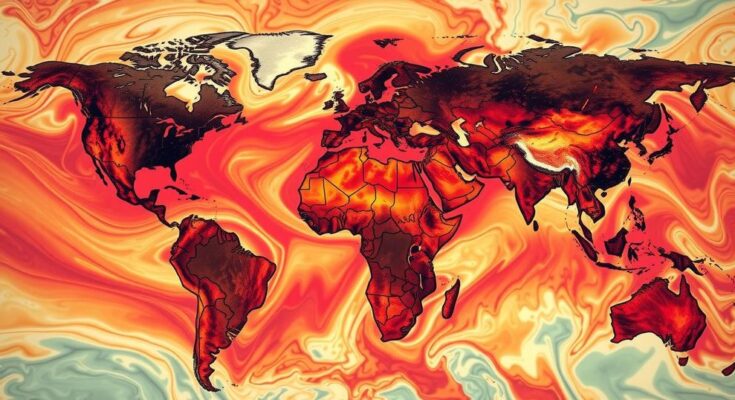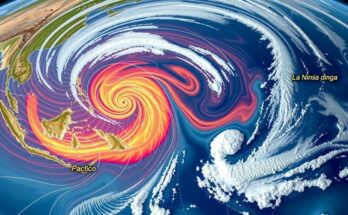In 2024, the world experienced 41 additional days of dangerous heat exacerbated by climate change, which is linked to severe weather patterns causing widespread harm. Researchers from World Weather Attribution and Climate Central noted that heat waves and extreme weather conditions have notably increased, leading to underreported heat-related fatalities and amplified health risks. This year served as a crucial indicator of the urgent need for action to combat climate change effects.
In 2024, climate change led to an alarming increase of 41 extra days of perilous heat globally. This finding, published by researchers from World Weather Attribution and Climate Central, indicates a direct correlation between human-induced climate change and extreme weather events. Notably, 2024 is projected to be one of the hottest years recorded, with extreme temperatures significantly impacting vulnerable populations worldwide. The researchers highlighted that climate change intensified various hazardous weather conditions, including catastrophic heat waves, droughts, and severe rainfalls, adversely affecting millions of lives.
In both urban and rural settings, individuals faced dire consequences from unprecedented heat, which prompted initiatives to assist those most affected, such as the distribution of water supplies to the homeless in Miami. Major tourist sites like the Acropolis in Greece were forced to close due to escalating temperatures, and schools in South and Southeast Asia experienced closures due to unsafe conditions. A detailed analysis of the year’s extreme weather events revealed that many were significantly influenced by climate changes. This connection between human activity and environmental changes not only exacerbated existing vulnerabilities but also posed new challenges in disaster management and public health.
The study noted that heat-related fatalities are notoriously underreported, underscoring the need for better communication regarding the dangers associated with heat waves. Researchers specifically pointed out that intense heat waves represent the deadliest form of extreme weather, highlighting the urgent need for enhanced awareness and action.
Furthermore, scientists assessed climate trends and identified that the planet is nearing the critical threshold set by the Paris Agreement, which aims to limit global warming to 1.5 degrees Celsius above pre-industrial levels. This year, 29 extreme weather events were meticulously examined, with an overwhelming majority linked to climate change. The El Niño phenomenon contributed to some abnormal weather patterns; however, the overarching influence of climate change was more significant.
Experts agree that without effective mitigation of heat-trapping greenhouse gases, extreme weather-related disruptions will escalate in both frequency and severity. Some scientists emphasized that the interplay between rising temperatures and human activities necessitates immediate action to mitigate future impacts. Notably, international efforts toward adaptation and preparedness can significantly decrease the toll of climate-related challenges across varied nations. This extensive report serves as a call to rapid action to address climate change and safeguard vulnerable populations worldwide.
Climate change continues to affect global weather patterns, resulting in increasingly severe weather conditions. In recent years, scientists and researchers have been emphasizing the need for urgent action to combat the effects of climate change and protect vulnerable communities. The year 2024 has been marked by record-breaking heat, exacerbating existing health and environmental issues. Understanding the impact of human activities on climate change is critical for formulating effective responses and fostering international cooperation toward sustainability.
The findings illuminate the urgent reality of climate change and its far-reaching implications, with 41 additional days of dangerous heat in 2024 serving as a grim reminder of the escalating crisis. Current trends highlight the necessity for global action to mitigate the impact of climate change and safeguard populations most at risk. Enhanced awareness, proactive measures, and international cooperation are essential to combat the intensifying effects of climate change and reduce future vulnerabilities.
Original Source: apnews.com




